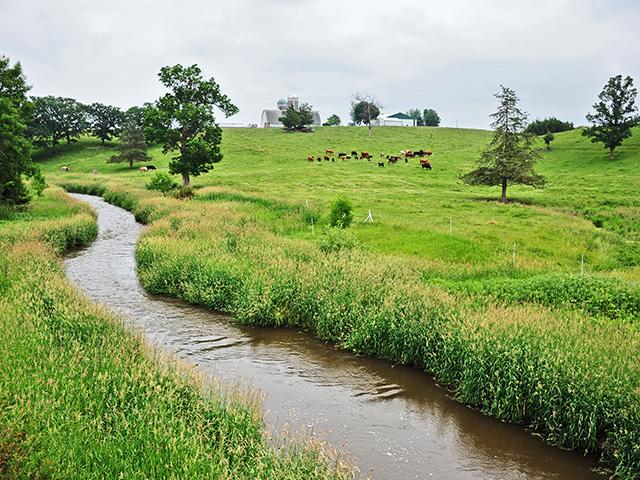WOTUS Stopped in 26 States After Ruling
Federal Judge in North Dakota Issues WOTUS Injunction in 24 States
OMAHA (DTN) -- The waters of the U.S. rule is now on hold in 26 states after a federal judge in North Dakota issued a preliminary injunction on Wednesday in the 24 states that filed a lawsuit against the Biden administration.
The U.S. District Court for the District of North Dakota's ruling now prevents enforcement of the WOTUS rule in Alabama, Alaska, Arkansas, Florida, Georgia, Indiana, Iowa, Kansas, Louisiana, Mississippi, Missouri, Montana, Nebraska, New Hampshire, North Dakota, Ohio, Oklahoma, South Carolina, South Dakota, Tennessee, Utah, Virginia, West Virginia and Wyoming.
Texas and Idaho previously received an injunction from the U.S. District Court for the Southern District of Texas.
The states along with several agriculture and other industry groups have argued in the lawsuit the latest WOTUS rule is a federal overreach and would exact serious costs to states and others to comply.
In his opinion and order, Judge Daniel L. Hovland said he agreed.
"The numerous declarations filed in this case by state officials outline in detail the specific costs of state compliance with the EPA's new 2023 rule, as well as the significant infringement on state sovereignty that confers standing on the named plaintiffs," Hovland said in the ruling.
"The 2023 rule does cause injury to states because they are the direct object of its requirements. And the states are also landowners with direct obligations under the Clean Water Act. There is not a mere possibility the new regulations will impact the states -- it is a given. The irreparable harm to the states that occurs with the implementation of the new 2023 rule is clear and undisputed."
Ag groups led by the American Farm Bureau Federation had asked the court to issue a national injunction against the rule, but the judge stopped short of that.
P[L1] D[0x0] M[300x250] OOP[F] ADUNIT[] T[]
The track the legal challenges to the new rule are taking is nearly identical to what occurred with the 2015 rule.
At one point during the legal battles on the Obama-era rule, there was a near 50-50 split on where the rule was being enforced.
AG REACTION
The National Cattlemen's Beef Association, one of the ag groups intervening in the lawsuit in North Dakota, said the ruling was important.
"Once again, the courts have affirmed that the Biden administration's WOTUS rule is overreaching and harmful to America's beef farmers and ranchers," NCBA President Todd Wilkinson said in a statement.
"Cattle producers in 26 states now have some additional certainty while this rule is being litigated, and we are optimistic that the Supreme Court will provide nationwide clarity on the federal government's proper jurisdiction over water."
Sometime this spring it is expected the Supreme Court will issue a ruling in Sackett v EPA. A ruling could determine how EPA and the U.S. Army Corps of Engineers make Clean Water Act determinations -- particularly when it comes to wetlands.
Agriculture and other groups pressed the agencies to hold off issuing the new rule until after the Supreme Court delivers an opinion. Hovland criticized EPA for moving forward with a rule while the Supreme Court ruling was pending.
"There is little public interest or any efficiency gained by implementing a new rule which codifies the 'significant nexus' test before the United States Supreme Court issues a decision in Sackett," Hovland said in the opinion.
Hovland added, "Common sense dictates that it only makes sense to wait. There is no urgency to implement the 2023 rule. The Supreme Court's decision in Sackett will be issued by June 2023 and will likely address many of the unresolved legal issues and jurisdictional determinations at the heart of this lawsuit."
Environmental groups and the federal agencies have tried to make the case that an injunction will lead to further environmental damage to water resources.
The judge disagreed.
"There is no legitimate concern that natural resources are threatened because all local lands and waters remain under the state's traditional protection," Hovland said in the opinion.
"A delay allows for a full and final resolution on the merits and is in the best interests of the public. The court finds that a far broader segment of the public would benefit from a preliminary injunction because it would ensure that federal agencies do not extend their power beyond the express delegation from Congress."
Read more on DTN:
"Ag Groups Seek WOTUS Pause Nationally," https://www.dtnpf.com/…
Todd Neeley can be reached at todd.neeley@dtn.com
Follow him on Twitter @DTNeeley
(c) Copyright 2023 DTN, LLC. All rights reserved.




